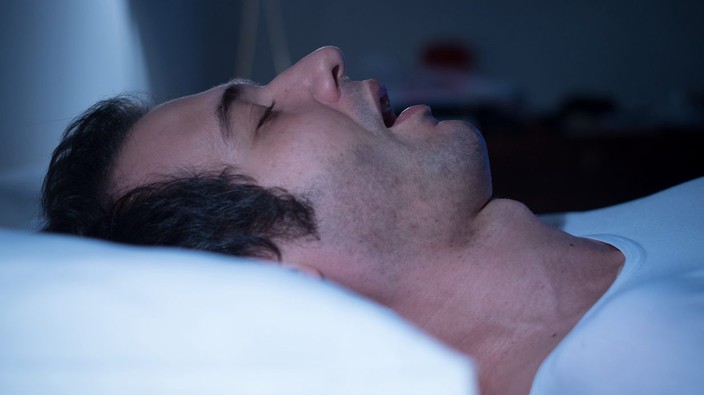obstructive sleep apnea linked to blood clots, cancer and cognitive decline
symptoms of osa can include a morning headache, fatigue, memory loss or a lowered sex drive.

around 5.4 million canadians have either been diagnosed with sleep apnea or are at high risk, according to a 2014 study. getty
a series of new studies may serve as a wakeup call for the millions of canadians who have been diagnosed with obstructive sleep apnea (osa).
according to new findings, presented at the european respiratory society’s international congress in barcelona, spain, people who suffer from the sleep disorder face an increased risk of cancer and blood clots as well as a decline in mental processing power in old age.
around 5.4 million canadians have either been diagnosed with sleep apnea or are at high risk, according to a 2014 study. osa, the most common form of sleep apnea, occurs when the upper airways become blocked, often because the soft tissue at the back of the throat collapses and obstructs the flow of oxygen to the lungs. many of the symptoms of osa are felt the next day, including a morning headache, fatigue, irritability or mood changes, poor concentration, memory loss or a lowered sex drive. people who are overweight or obese, drink or smoke heavily or who have diabetes face the greatest risk of diagnosis.
oxygen deprivation linked to cancer and cognitive decline
“it is known already that patients with obstructive sleep apnoea have an increased risk of cancer but it has not been clear whether or not this is due to the osa itself or to related risk factors for cancer, such as obesity, cardiometabolic disease and lifestyle factors,” said andreas palm, a researcher and senior consultant at uppsala university, sweden, who presented the first study. “our findings show that oxygen deprivation due to osa is independently associated with cancer.”
advertisement
the study matched 2,093 patients with osa and a cancer diagnosis that occurred up to five years before their osa diagnosis to a control group of the same size that had osa but not cancer. researchers measured the severity of the sleep disorder using the apnea hypopnea index (ahi measures the number of breathing disturbances during sleep) or the oxygen desaturation index (odi measures how many times per hour that levels of oxygen in the blood fall by at least three per cent for 10 seconds or longer).
“we found that patients with cancer had slightly more severe osa, as measured by an apnea hypopnea index average of 32 versus 30, and an oxygen desaturation index of 28 versus 26,” palm said. “in further analysis of subgroups, odi was higher in patients with lung cancer (38 versus 27) prostate cancer (28 versus 24) and malignant melanoma (32 versus 25).
“the findings in this study highlight the need to consider untreated sleep apnoea as a risk factor for cancer and for doctors to be aware of the possibility of cancer when treating patients with osa,” the study authors wrote. “however, extending screening for cancer to all osa patients is not justified or recommended by our study results.”
the study, which was limited by the fact that it relied on data from a single point in time, does not show that osa causes cancer, only that it is associated with it.
advertisement
the second study tested the presence and severity of osa in 358 participants who were 65 years of age or older before following up with them every five years to assess their mental processing and cognitive abilities.
“we found that osa and, in particular, low oxygen levels during sleep due to osa, was associated with a greater decline in global cognitive function, processing speed, executive function and verbal memory,” said raphaël heinzer, director of the centre for investigation and research on sleep (cirs) at lausanne university in switzerland. “we also found that people aged 74 and older and men were at higher risk of cognitive decline related to sleep apnea in some specific cognitive tests.”
the study, which was limited by the relative good health of participants and the fact that osa was only assessed at the beginning of the study, showed “that the severity of sleep apnea and night-time oxygen deprivation contribute to cognitive decline in old age” but that not all people face the same risk. researchers plan to follow up with participants at the 10-year mark to gain a better understanding of who may be most affected by osa-related cognitive decline.
obstructive sleep apnea connected to blood clots
advertisement
the third study, which followed 7,355 patients over the course of six years, found that patients with more severe osa were more likely to develop venous thromboembolism, better known as blood clots.
“this is the first study to investigate the association between obstructive sleep apnea and the incidence of unprovoked venous thromboembolisms,” said wojciech trzepizur from angers university hospital, france. “we found that those who spent more than six per cent of their night-time with levels of oxygen in their blood below 90 per cent of normal had an almost two-fold risk of developing vtes as compared to patients without oxygen deprivation.
“further studies are required to see whether adequate treatment for osa, for instance with cpap treatment, might reduce the risk of vtes in patients with marked nocturnal oxygen deprivation.”
dave yasvinski is a writer with healthing.ca
thank you for your support. if you liked this story, please send it to a friend. every share counts.
 4 minute read
4 minute read





